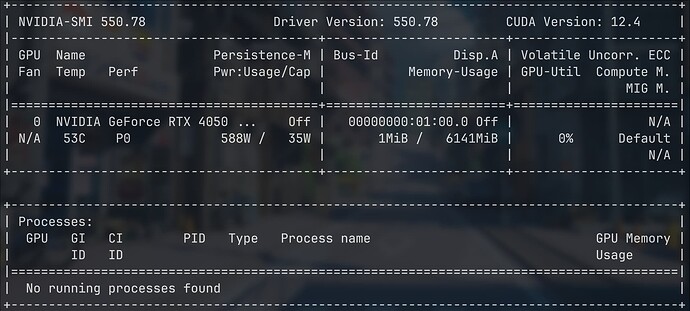I’ve been battling with cuda on nixos for a few months now and almost have a working setup.
Courtesy of this flake:
{
description = "Python 3.11 development environment";
outputs = { self, nixpkgs }:
let
system = "x86_64-linux";
pkgs = import nixpkgs {
inherit system;
config.allowUnfree = true;
};
in {
devShells.${system}.default = (pkgs.buildFHSEnv {
name = "nvidia-fuck-you";
targetPkgs = pkgs: (with pkgs; [
linuxPackages.nvidia_x11
libGLU libGL
xorg.libXi xorg.libXmu freeglut
xorg.libXext xorg.libX11 xorg.libXv xorg.libXrandr zlib
ncurses5 stdenv.cc binutils
ffmpeg
# I daily drive the fish shell
# you can remove this, the default is bash
zsh
# Micromamba does the real legwork
micromamba
]);
profile = ''
export LD_LIBRARY_PATH="${pkgs.linuxPackages.nvidia_x11}/lib"
export CUDA_PATH="${pkgs.cudatoolkit}"
export EXTRA_LDFLAGS="-L/lib -L${pkgs.linuxPackages.nvidia_x11}/lib"
export EXTRA_CCFLAGS="-I/usr/include"
"/home/safri/.nix/cuda/env.sh"
# Initialize micromamba shell
eval "$(micromamba shell hook --shell zsh)"
# Activate micromamba environment for PyTorch with CUDA
micromamba activate pytorch-cuda
'';
# again, you can remove this if you like bash
runScript = "zsh";
}).env;
};
}
and a micromamba environment:
micromamba env create \
-n pytorch-cuda \
anaconda::cudatoolkit \
anaconda::cudnn \
"anaconda::pytorch=*=*cuda*"
I now have my gpu actually working with openai-whisper. The only problem is that whisper now fails to work with any of the larger models (despite it working just fine when I was on Arch linux with the same computer), it simply exits with:
torch.cuda.OutOfMemoryError: CUDA out of memory. Tried to allocate 254.00 MiB. GPU
The gpu also doesn’t seem to be working when whisper isn’t running even though I have set:
services.xserver.videoDrivers = [ "nvidia" ];
My NVIDIA config is:
services.xserver.videoDrivers = [ "nvidia" ];
hardware= {
opengl.enable = true;
nvidia = {
open = false;
powerManagement.enable = false;
nvidiaSettings = true;
modesetting.enable = false;
package = config.boot.kernelPackages.nvidiaPackages.stable;
prime = {
offload.enable = false;
nvidiaBusId = "PCI:1:0:0";
intelBusId = "PCI:0:2:0";
};
};
};
Just in case it’s relevant:
boot.initrd.availableKernelModules = [
"xhci_pci"
"thunderbolt"
"nvme"
"usbhid"
"usb_storage"
"sd_mod"
];
boot.initrd.kernelModules = [ ];
boot.kernelModules = [ "kvm-intel" ];
boot.extraModulePackages = [ ];
Is in my hardware-configuration.nix
While in the venv, its clear that the cuda is working:
>>> import torch
>>> print(torch.cuda.is_available())
True
It’s using cuda version 11.8
My main system is running a wayland compositor (hyprland) on NixOS 24.05
Can somebody please tell me why whisper is failing with any model above medium despite my gpu being enough to run the higher models?
Any help would be appreciated.
